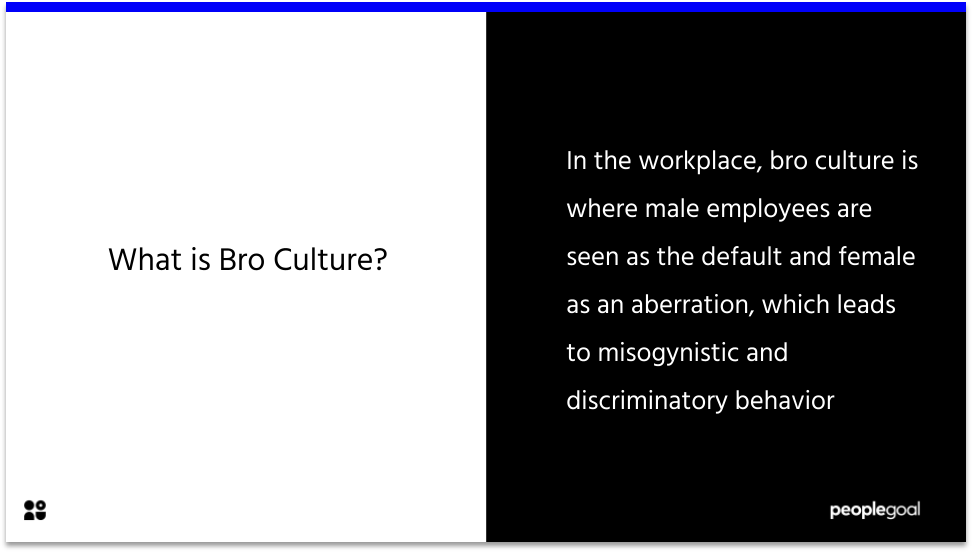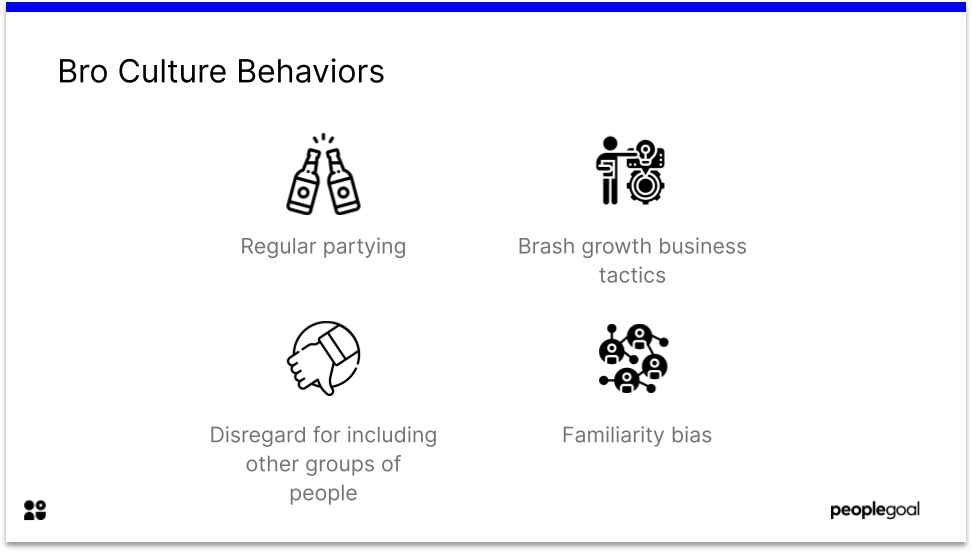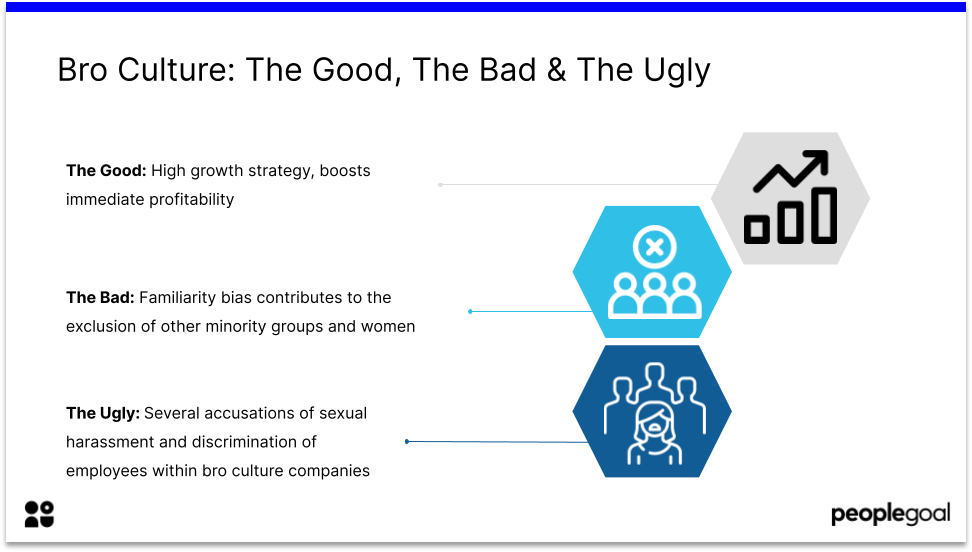Gender equality has driven disparity between men and women for most of human history. Since the agricultural revolution about 12,000 years ago, globally men have accumulated ever more power over their female counterparts. Despite the relatively recent efforts of the Suffragettes, the Civil Rights Movements and international legislations, our patriarchal society has continued to undermine the treatment of women, particularly in the workplace. At the forefront of this oppression is the toxic reality of ‘bro culture’.
Characterized as young, typically white men that enjoy spending their time partying with others like themselves, the bro culture is a product of organizations with a male-dominated workplace. A significant amount of tech companies from Silicon Valley have been labeled as manifesting this bro culture, including Google and Uber among others. Unfortunately, some have also been tied to cases of sexual harassment and other negative or discriminatory behaviors.
The reception of bro culture in the workplace has been met with very mixed views (essentially, depending on whether you are a bro or not). A quick scan through the headlines about bro culture would suggest that for many, it is regarded as a toxic environment to work in. Although, others have argued that this brash approach to business growth could still yet serve some necessary functions. Developing a full understanding of just what bro culture is and where it has come from will allow us to determine how this type of company culture can affect an organization and importantly, its employees.
What is Bro Culture?
Put simply, in the workplace, bro culture is where male employees are seen as the default and female as an aberration, which leads to misogynistic and discriminatory behavior against those that are not recognized as the same.

History of Bro Culture
Reflecting on the evolution of bro culture will reveal how it has now spread into many company cultures. Understanding that the meaning of the term has shifted away from someone’s sibling to now refer to any male friend demonstrates how the bro culture establishes a familiarity bias in groups of young men.
Within these bro cultures, it is difficult to diversify a team. These toxic company cultures are sustained through a repeated cycle of favoritism and familiarity that enables the maintenance of male-dominated organizations. Associations with sexual harassment, underrepresentation of women and minority groups as well as an affliction for partying suggest that when a company culture is taken over by bro culture, it harks back to the typical behaviors found in any college ‘frat house’.
Etymology of Bro
The term ‘Bro’ is an abbreviation of the word brother, which of course means a male sibling. Whilst it is believed that bro may have originally been used in the familial sense, in the 1970s we see the first evidence of bro being used to refer to another man or male friend. From these origins, the term has become increasingly associated with a specific group of young men.
The bros of today are identified as almost any young man. Discussions around the specific traits of a bro are varied. Fundamental to the characteristic of any bro, however, is their tendency to socialize with others similar to themselves. This familiarity bias, in turn, contributes to the development of the bro culture.

Origins in the Workplace
Prior to the Equality Act and other legislation supporting the rights of female workers, there was a significant disparity between male and female workers. Positions of power in organizations would be male-dominated and rates of sexual harassment in the workplace were shockingly high for women.
Even today, the gender pay gap] persists. Additionally, particular industries, such as the tech industry, are heavily male-dominated. The resultant ‘boys club’ type of company culture that is formed can be very difficult for ‘outsiders’ to infiltrate. This lack of inclusion and fetishization of the bro has led to a widespread outcry against the bro culture.
The New York Times has published numerous articles condemning the behaviors of these reckless organizations. One stand-out example that featured in their paper was a book called Brotopia: Breaking Up the Boys’ Club of Silicon Valley written by Emily Chang. In a nutshell, Chang reveals the dark inner workings of some of the biggest tech companies based in Silicon Valley. The male-dominated industry has facilitated the establishment of unethical and unfair company cultures with different opportunities for male and female workers.
Bro Culture in the Workspace
Below we reflect on the impact of bro culture in the workplace from a number of perspectives. By contrasting the better aspects of bro culture against the more negative qualities, we can start to understand the impact that it has on work practices and behaviors.
Moreover, we can better understand the reputation and stigma that have developed as a result of the media attention around the actions of various organizations that have a reputation for maintaining the bro culture.

The Good
The trend of bro culture in the workplace skyrocketed with the tech boom of the late 2000s. Recently graduated frat boys and other ‘brogrammers’ were presented with the unmissable opportunity to continue the party lifestyle of college whilst earning a significant salary for growing tech giants. Since bro culture values quick growth, this was a match made in bro heaven.
From the perspective of a bro, the experience of working for a company that recognized their need to integrate sports and other competitive activities within their weekly routine was almost too good to be true. Such a company culture championed a brash approach to work. Those capable of high levels of output would contribute to the significant growth of the company.
With little regard for HR or the inclusion of those not as interested in partaking in the weekly beer pong tournament, companies that were supportive of bro culture would attract evermore individuals with a similar passion for this way of working. The result of this being a continuation of these male-dominated and broody company cultures.
The Bad
For all of the benefits that a bro gains from working in a bro culture, there must be a consideration for anyone that is excluded within this working environment. Studies show that diverse companies perform better, hire better talent and have more engaged employees. With this is in mind, it is evident that companies that support a bro culture are unsustainable.
Diversity is the key to a companies long-term success. Yet bro culture is fundamentally obstructive to diversity. Looking back at the example of the tech industry (a known hot spot for bro culture), there is a serious lack of female employees. Considering women represent half of the adult workforce in the U.S., as of 2015, the National Center for Women and Information Technology reports that they held only 25% of roles in tech.

Whilst these companies may not originally set out to create a toxic bro culture, due to the male-dominated nature of particular industries, this can all too easily happen. With such a big influx of men within these industries, the bro culture cycle is reinforced which in turn can potentially harm the productivity of the organization. Serious efforts must be made to push back against this current trend.
& The Ugly
Presently, there is an alarming rate of reports of sexual harassment cases that are being made against senior employees working within many leading tech companies. At the heart of the narrative, there is a strong sentiment that bro culture has facilitated these disgraceful acts.
The wild parties and relaxed misogynistic conversations held within these organization illustrate a company culture that might expect to hear within a sports team but not a professional organization.
Whilst running a company that supports bro culture might mean fun for all of these young men in the short term, there increasingly more and more cracks beginning to show. The New York Times reports that Uber’s CEO Travis Kalanick created the toxic culture that has now contributed to its decline. Through a combination of sexual harassment and discrimination of female employees including Susan Fowler, a former engineer at Uber, along with Kalanick’s own irresponsible acts, the tech giant has significantly subsided after its initial explosive growth.
There is a lot to be learned from companies that have brought bro culture into the workplace. Whilst they may originally experience a jovial period of growth and disruptive promise, their evasion from diversification ultimately leads to their deterioration. The reputation that also comes with the bro culture is now tainted by an intolerable history of discrimination.
The party spirit of Silicon Valley has dwindled as organizations recognize the importance of maintaining an inclusive and professional company culture that allows male and female employees to feel safe and respected in the workplace.
Ready to 3x Your Teams' Performance?
Use the best performance management software to align goals, track progress, and boost employee engagement.





